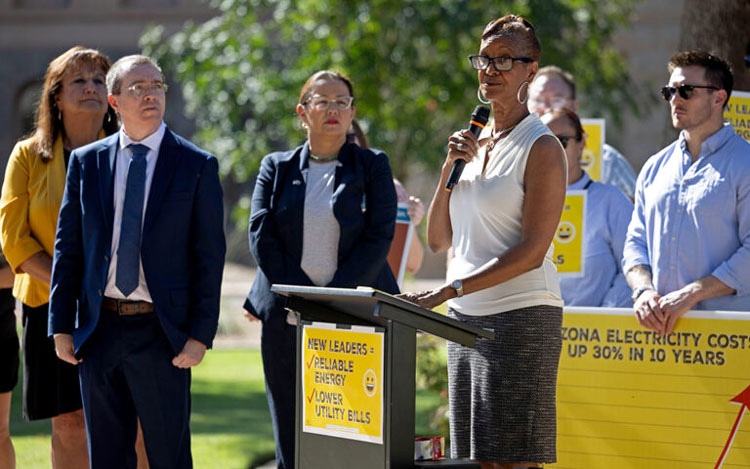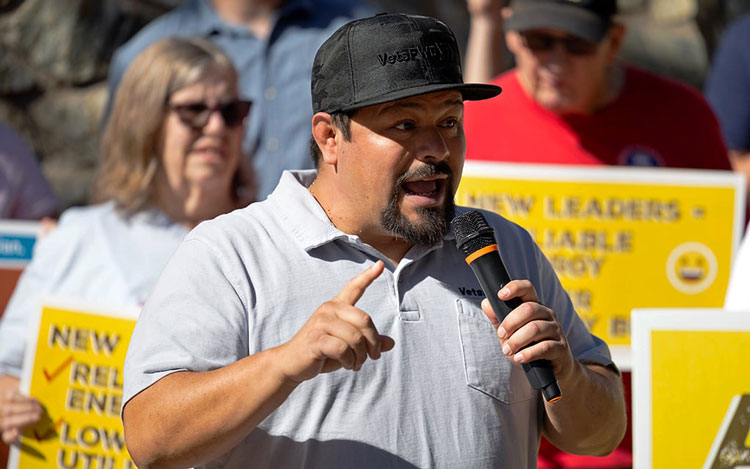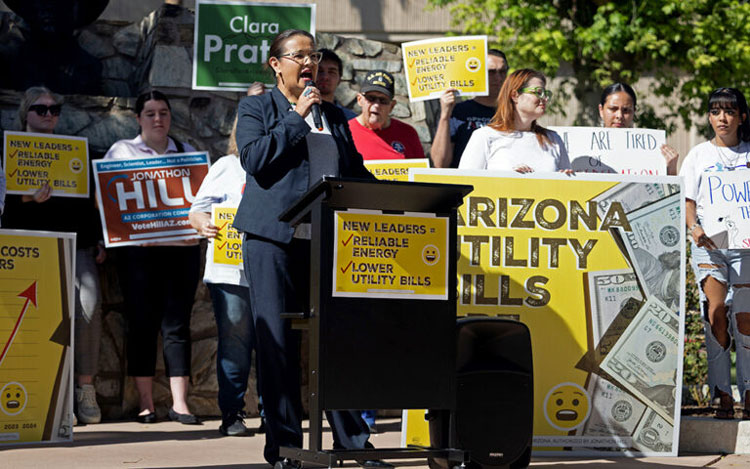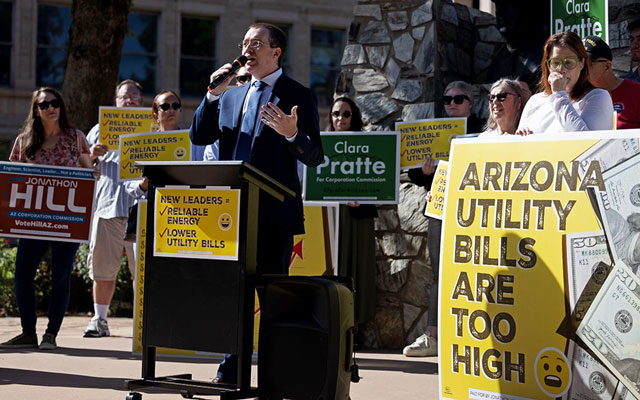By Gabrielle Wallace/Cronkite News
PHOENIX — Anna Cicero, a retired educator who lives in Chandler with her daughter and grandson, held her utility bill up while speaking behind a podium in the Rose Garden of the Arizona Capitol. She spoke passionately about the rising utility rates and their effects on her family.
“I can try to find cheaper eggs or just skip cholesterol,” Cicero said. “But I cannot switch to a cheaper electrical company.”

Cicero said she’s scared to check her bill every month. Two other concerned Arizonans joined her at the podium, echoing the sentiment. Many more stood behind the podium, holding up signs demanding that rate hikes stop.
The concerned residents spoke on Wednesday morning at a press conference on high energy and utility rates across the state. They were joined by Arizona Corporation Commission candidates Jonathon Hill and Clara Pratte, as well as Salt River Project board member Sandra Kennedy.
The ACC oversees utility companies, requiring companies to file rate increase requests for approval from the commission. It is made up of five elected commissioners who oversee the executive, legislative, and judicial proceedings related to water, electricity, telephone, and natural gas resources.
“One of the problems with the American dream is that you are subject to here in Arizona, the Arizona Corporation Commission and APS raising our bills every year,” said Ricardo Reyes, executive director of VetsForward.

Reyes shared the story of a veteran he knew who was forced to choose between food for her family and her utility bills. The bills eventually piled up, and her power was shut off until she received help from nonprofit organizations to pay her utilities.
“Veterans should not have to go and beg for help from nonprofits,” Reyes said. “That is outrageous to me, that our bills, our electricity bills, are so high at the same time that these companies are raking in record profits every single year.”
Since 2020, more than 270 people have died at home from heat-related causes, according to an Arizona Republic investigation.

While rate increases are at the request of the utility company, the increase must be approved by the ACC.
In June, Arizona Public Service requested a 14% rate increase, set to begin in 2026. Pinnacle West, the parent company of APS, made more than $600 million in profits in 2024.
The utility previously asked for a 13.6% rate increase in 2022. Ultimately, the commission instead approved an 8% rate increase in 2024. However, in a rate case update, APS said the 8% increase was based on costs from three to four years ago.
In a statement on its website, APS explained its logic behind the hikes.
“We understand rising costs are impacting so many aspects of customers’ lives today and that it’s never a good time to see bills increase,” the statement read. “That’s why we’re focused on doing our part to keep our costs down as much as we can, while giving customers tools, programs, and choices to help them manage their bills. Reliability isn’t optional —it’s essential, especially in Arizona.”
Attorney General Kris Mayes announced in September that her request to intervene in the APS rate increase application was granted. Mayes said the request was “outrageous” and exploitative. Mayes previously served on the ACC.
Mayes will also host a town hall in Sun City West on Tuesday to hear about the impacts of high electricity rates on consumers.
SRP is a not-for-profit company and is not governed by the ACC. SRP also implemented a rate increase that will begin with the November bill cycle, increasing the average customer’s bill by 3.5% or $5.61 monthly.
Kennedy, an elected member of the SRP board, prefaced that she was representing her own views and was not there on behalf of SRP. Kennedy previously served on the ACC in 2008.
“If you’re an SRP customer, you can’t take your concerns to the Arizona Corporation Commission, you can’t appeal the board’s decision,” she said. “You are stuck, and that’s a fundamental problem of fairness and oversight and Arizona.”
Kennedy encouraged SRP customers to vote in the utility’s board election in April.
Arizona voters will choose two of the commission members in November 2026. Two of the five seats are up for grabs.
“It doesn’t matter if you live in Tempe, Window Rock, Nogales, Yuma, all over Arizona,” said Hill, one of the ACC candidates at the press conference.. “This is affecting everybody, no matter what utility company you have.”
If elected, Hill promised to keep looking for unconventional solutions to rising utility rates.
Pratte, the other candidate and a Flagstaff resident, said that each month when she opens her bill, she’s shocked and wonders how families can afford the high prices.
“If we don’t elect new leaders to the Arizona Corporation Commission, our bills are going to keep having some of the highest rate increases in the country, in this state,” she said.
Pratte said she uses a spreadsheet for the best times to run her washer and dryer, but that it shouldn’t be that complicated.
“It shouldn’t take a rocket science degree,” she said, “to figure out how to manage your utility bills.”








